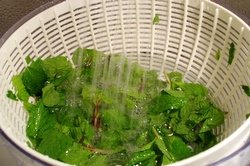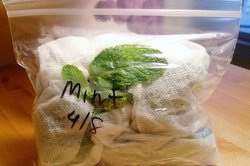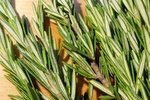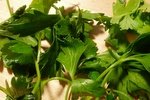
Q: How do you wash herbs?
A: I use a salad spinner . Believe it or not I bought it just for that purpose. I mean, who washes salads these days when you can buy pre-washed mixed greens?
. Believe it or not I bought it just for that purpose. I mean, who washes salads these days when you can buy pre-washed mixed greens?
A: I use a salad spinner

Before I bought a salad spinner, I filled a large bowl with cold water and let the herbs soak for 5 minutes allowing the sand to settle on the bottom. Then I would scoop them out (being careful not to disturb the sand) and lay them out on paper towels to dry.
Q: How do you keep herbs fresh?
A: After washing herbs, and drying most of the water off them (that’s when the spinner comes in handy), I wrap them in a dry paper towel and stuff them in zip lock bags. Since I have several such bags in my fridge at one time, I write the herb and date on the bag to help me figure out which is which. Wrapped this way, the herbs stay fresh at least 1 week.

Q: What’s the best time to add herbs to your dish?
A: All herbs are split into two categories: hard herbs and soft herbs. I never heard those terms used in culinary literature, so I am not sure if those are technical definitions or if I just made them up, but it’s distinctions that I find useful.
Hard herbs, like rosemary, sage and thyme are sturdy and I add them to my dishes in the beginning of cooking.

Soft herbs, like parsley, cilantro, mint, dill, and chives are delicate and turn brown and yucky when cooked. I add them in the last minute of cooking time, or after taking the dish of the heat.

Q: Most dishes call for just a few sprigs of a particular herb. What do you do with the rest of the bunch?
A: If I have soft herb leftovers, I often make a pesto type dip for bread. These little sauces take 5 minutes to make in a food processor and are excellent on top of fish, chicken, and lamb. They also are perfect for mixing into pasta or serving as a spread for sandwiches. The possibilities are endless if you use your imagination.
Here are some ideas to get you started:
Basil Pesto:
Basil, Pine nuts, parmesan, garlic, olive oil, butter (recipe)
Mint-Pistachio Pesto:
Mint, Pistachios, garlic, olive oil
Maidanosalata (Greek parsley spread):
Parsley, garlic, lemon juice, 1 piece of bread without crust, olive oil
Salsa Verde:
Parsley and some other herb of your choice, lemon zest and juice, capers, anchovy, olive oil (recipe)
Cilantro-Lime Sauce:
Cilantro, lime zest and juice, garlic, olive oil
You don’t really need measurements for these sauces. Just be conservative with the garlic. One or even half a clove is all you need. Start by processing the herbs with the other ingredients, except for olive oil. When everything is well chopped, keep the food processor running, and drizzle in enough olive oil to form a paste that is as thick or thin as you’d like.
You can also make chive, parsley, or mint oil by combining the appropriate herb with some olive oil in a blender instead of a food processor and pureeing until completely smooth. Drizzle some of this great stuff over your plate and you can turn any weekday dinner into a restaurant quality meal.
When I have hard herbs leftover, I often throw a bunch on the grill when cooking fish or meat. The smell is intoxicating and in makes whatever you are cooking extremely aromatic. You can also cook hard herbs like rosemary or oregano in olive oil on very low heat to infuse it with that herb’s flavor. Sage leaves are awesome pan-fried in a few tablespoons of butter until crispy and then stirred into pasta or gnocchi (along with all that deliciously infused butter, of course).
So, what are you waiting for? I am sure you have some herbs in your fridge that can be turned into something yummy instead of languishing in anonymity until they wilt. Have fun!

14 comments:
Very nice post Helen.
It is quite funny as I have a whole article I was about to post about different kinds of pesto. I love the new concept I learned today about har and soft herbs!
thats a good tip......marvellous with the word soft and hard herbs...now i can use them in my recipe and classes.
This would have been a great addition to Herb Blogging Weekends at Kalyn's Kitchen ...
hiya helen, great tips! ps my dh studied cs at cmu too :)
Hey mini,
What's his name and when did he graduate? Maybe we had classes together :)
Cheers,
-Helen
This is perfect for WHB and I'd love to include it next week. Thanks.
Awesome post, Helen. Growing up, I never really saw much in the way of herbs, so now that I'm all grown up, it's like a whole new world of food has opened up. Silly, but true.
BTW, I do realize I was tagged for a meme, but I haven't had a chance to post, yet. I'll get to it in the next week, or so.
Hi Erin,
No rush -- you can participate in that meme whenever you are inspired to do so :)
Cheers,
-Helen
Have you ever freezed your herbs in ice cube trays?
ditto the previous question: I have my first herb garden this summer, and am expecting more than I can use immediately. Strategies for freezing? As a neophyte, if you (or anyone else) has recommendations on the best way to harvest leaves from basil, thyme, dill or tarragon, I'd love to know if there are good or bad ways. My mint and parsely are so weed-like I assume that I should just grab leaves.
Hi Allan,
I believe that hard herbs (like rosemary) should freeze pretty well due to the lower water content. Kaffir Lime leaves and bay leaves freeze incredibly well for example. But when it comes to soft herbs, I prefer not to freeze them. From what I hear, people freeze all kinds of pesto. I believe even Marcella Hazan (Julia Child of Italian cooking) says you can freeze it as long as you hold off on adding the butter, garlic, and cheese right before serving. I tried that once and what can I say? It's not nearly as good as fresh. But you can try it and decide for yourself. If you are looking for ways to bring the flavor of those herbs into the cold months, try infusing oils with them. As far as freezing unprocessed soft herbs (not like pesto), I've never tried that. Maybe you can do a small scale experiment now to see what happens so that you know if it's worth the trouble in the end of the summer. Do let me know if you try it -- now I am curious.
Cheers,
-Helen
This is a wonderful, informative site on herbs! However, we have tarragon running out of our ears - is it possible to freeze it? Also, we have a huge container of peeled fresh garlic - do you think we could roast it with a little olive oil and then drain and freeze it?
Hi Carol,
Sorry, I've never freezing tarragon and roasted garlic. It's worth a try :)
Cheers,
-Helen
hi carol - I roast garlic all the time, not only in oil, but I slow roast it in butter as well. I use the oil for sauteeing anything, and I often run the butter through my processor for my own garlic butter. It's fabulous in potatoes, rice, pasta, pesto, grilled sandwiches, or on grilled crustini with brie. I've also combined the butter with herbs and it's divine. I've never had a problem freezing the butter. The oil never lasts long enough to freeze. But when I roast garlic in oil, I use very little oil. I use either the oil or butter to make garlic roasted chicken. If you roast your potatoes in the same pan at the same time, along with maybe some carrots, the garlic infuses everything and life can start getting serious. Have fun!
Post a Comment